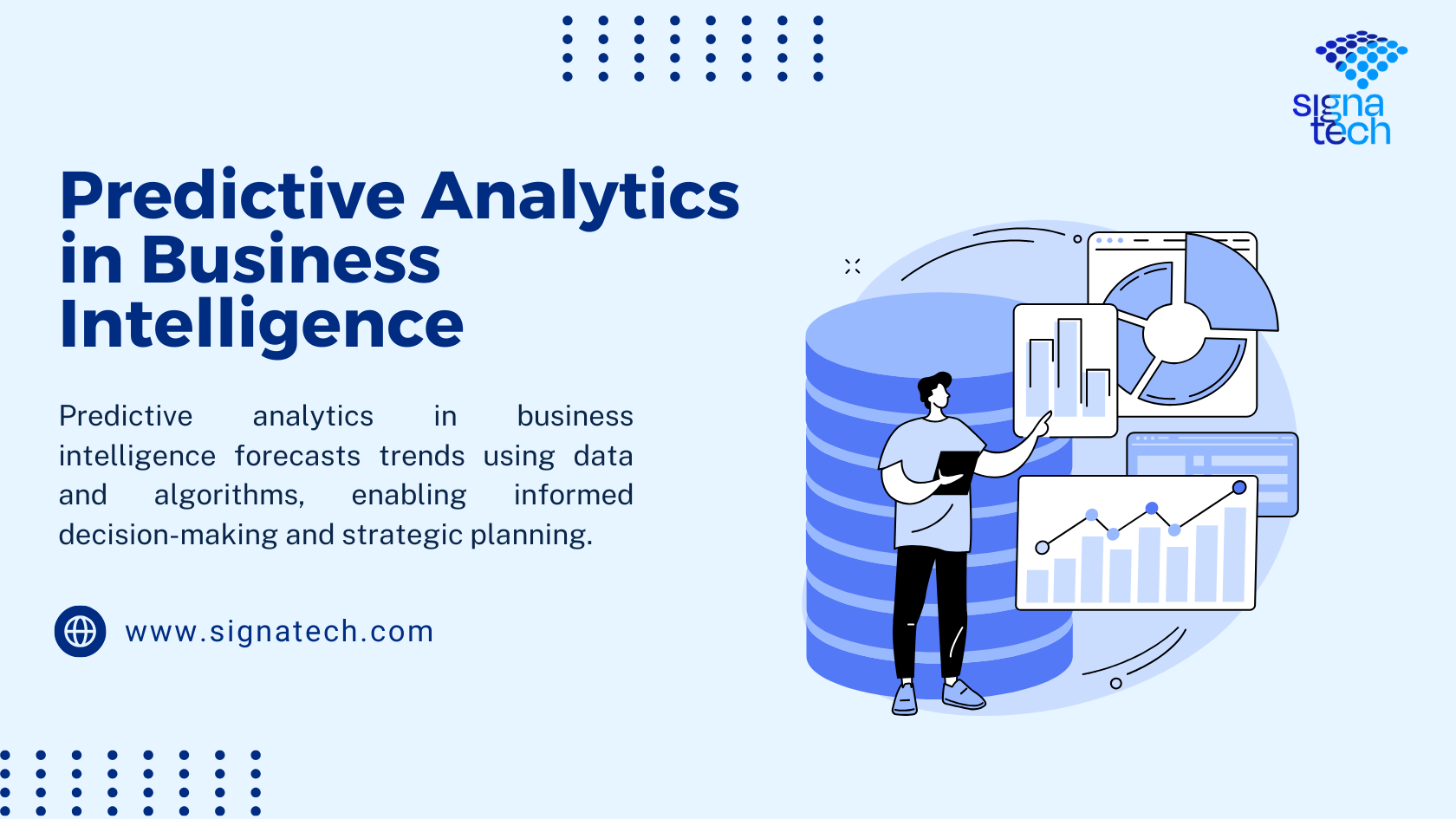As we can observe today’s highly competitive business environment, just identifying what has occurred in the past is also insufficient. Companies are always on the lookout for how they can keep an edge, and predictive analytics in business intelligence is the solution. Through employing trends and patterns from past data, predictive analytics prepares business organizations to be able to prevent and not to only respond to occurrences. This integration enhances decision-making processes and helps businesses in organizational planning by enabling them to foresee risks, identify new opportunities, and gain a deeper understanding of their customers. In this blog, we’ll explore the basics of this powerful tool, why it is used, how it can be applied, various techniques, and ways it’s used in different industries, and the future of this software.
Understanding Predictive Analytics in Business Intelligence
Predictive analytics is one of the segments of analytical techniques of big data analytics which forecast the future trend of different parameters using a variety of statistical methods and techniques of machine learning. This creates a formidable combination when used in the management of firms. While traditional BI deals with using dimensions to analyze what has transpired in the past, predictive analytics takes it to the next level and predicts what is most probable to happen. This saves future contingencies by having a lens cast ahead, enabling organizations to place contingency actions as a priority on managing change and ultimately delivering greater value.
Key Benefits

The application of predictive analytics in BI systems has proved to have many advantages that affect different areas of business. Here are the main advantages:
Enhanced Forecasting
Sales and demand forecasting are among the key benefits of using business intelligence analytics in business to direct resources for inventory, staffing as well as budgeting during different seasons.
Operational Efficiency
The predictive of the bottlenecks implemented in predictive analytics in business intelligence ensures that resource needs are addressed ahead of time, helping to avoid cumbersome processes that are expensive.
Better Customer Insights
The use of predictive analytics provides insight of customer need, and this can help businesses deliver targeted products and services that will improve satisfaction and decrease customer churn.
Risk Management
Detecting fraud patterns is done in finance while in manufacturing and logistics, predictive analysis helps in identifying potential supply chain hitches hence reducing risks.
Predictive Analytics Techniques
Several techniques within predictive analytics make it possible for businesses to forecast and prepare for the future:
Regression Analysis
Regression analysis is used to study the connection between variables to make predictions; for example, how much sales can be expected from a given advertising budget. This is due to the fact that it is easy to implement, making it suitable for use in predictive modeling.
Time Series Analysis
This type of analysis takes data over intervals and examines the trends and patterns of the data. This is particularly beneficial to companies, particularly in the retail and finance sectors, which need to determine their sales and stock prices during high or low seasons with the help of predictive analytics in business intelligence.
Machine Learning Algorithms
Machine learning modifies predictive analysis with tools such as decision trees and neural networks since they give better predictions from previous data.
Clustering and Classification
Aggregation and categorization are similar to the process of classification of data according to the similarities found in them. Clustering helps in the formation of customer segments while classification helps in grouping of data for example in the case of finance the transactions can be grouped as either ‘fraud’ or ‘not fraud’.
Applications Across Industries
Predictive analytics in business intelligence is not limited to any one sector; its applications are broad and impactful across multiple industries:
Retail:
Predictive analytics assists retailers in inventory planning, avoiding stock-outs, and delivering targeted campaigns, which increase customer engagement and sales.
Healthcare:
In healthcare, predictive analytics helps to identify patient who may be at risk, support timely interventions, manage resources effectively and minimize readmissions.
Finance:
Banks and other financial institutions apply predictive analytics to mitigate risks, control fraud and make better investment decisions for credit risk evaluation and portfolio management.
Manufacturing and Supply Chain:
This also allows manufacturers to predict demand, stock control and can also identify system breakdowns. It also enhances the time taken in the delivery of goods in supply chains.
Future of Predictive Analytics in Business Intelligence
The future of advanced analytics is therefore associated with developments in artificial intelligence and machine learning. Some of the trends include real time predictive analysis which will enable organizations to make decisions on a real time basis with the help of analysis. In business intelligence, predictive analytics will get closer to real-time processing as data processing speed increases, providing businesses with a timely and accurate picture of the market and its changes. Further, with the help of recent AutoML tools, even small businesses can incorporate predictive analytics into their operations; thus, it has become a very strong BI tool.
Business intelligence is being revolutionized by predictive analytics in a way that provides a proactive outlook that enables organizations to make strategic decisions and respond appropriately. With data becoming the new oil, predictive analytics will be the key determinant of future business strategies to enable organizations to prepare adequately. For companies willing to adopt these insights, Signatech offers business intelligence consulting services to help companies to get the most of predictive analytics. Contact us today to discuss specific solutions that will fit your business needs.
